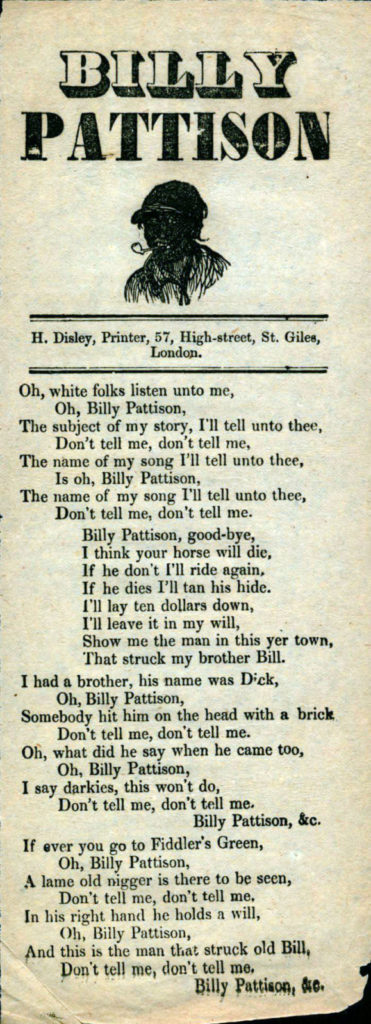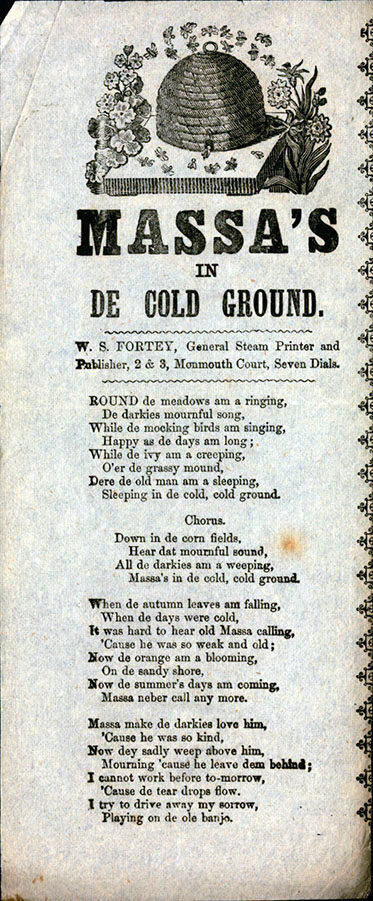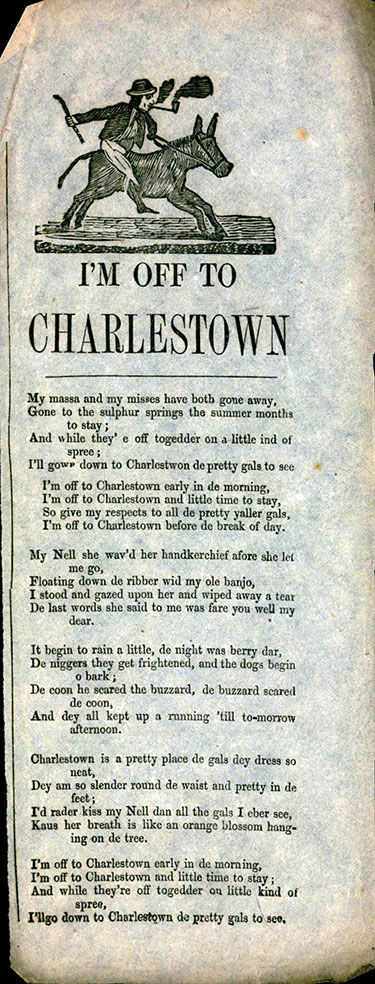The Graphic Arts Collection recently acquired 10 small minstrel song sheets with lyrics and small vignettes. Many, not surprisingly, are racially charged and offensive. Here are a few.  Massa’s In De Cold Ground (caption title above). London: Printed and published by H. Such, [ca. 1850]. British music sheet with a West India slave woodcut vignette at top, printing the words to a black minstrel song: “Round de meadows am a ringing / De darkies mournful song, / While de mocking birds are singing, / Happy as de day am long; / While de ivy am a creeping / O’er the grassy mound; / Dere de old man am a sleeping. / Sleeping in the cold, cold ground.”
Massa’s In De Cold Ground (caption title above). London: Printed and published by H. Such, [ca. 1850]. British music sheet with a West India slave woodcut vignette at top, printing the words to a black minstrel song: “Round de meadows am a ringing / De darkies mournful song, / While de mocking birds are singing, / Happy as de day am long; / While de ivy am a creeping / O’er the grassy mound; / Dere de old man am a sleeping. / Sleeping in the cold, cold ground.”
Massa’s In De Cold Ground (caption title below). [N.p.]: W.S. Fortey, [ca. 1850]. Beehive woodcut vignette. British song sheet with black minstrel-style song.
 Miss Lucy Long (caption title). Birmingham: Printed and Sold by T. Watts, [n.d. but ca. 1850]. English minstrel song sheet with woodcut vignette of a street peddlar surrounded by several children: “Since you wish to hear me, / Sing a little song, / I’ll sing a very pretty one, / Concerning Lucy Long, / She used to play the fiddle, / When to parties we did go, / And I used to charm the niggers, / Upon the old banjo.”
Miss Lucy Long (caption title). Birmingham: Printed and Sold by T. Watts, [n.d. but ca. 1850]. English minstrel song sheet with woodcut vignette of a street peddlar surrounded by several children: “Since you wish to hear me, / Sing a little song, / I’ll sing a very pretty one, / Concerning Lucy Long, / She used to play the fiddle, / When to parties we did go, / And I used to charm the niggers, / Upon the old banjo.”
 https://tunearch.org/wiki/Annotation:I%27m_Off_to_Charlestown
https://tunearch.org/wiki/Annotation:I%27m_Off_to_Charlestown
I’m Off To Charlestown (caption title above and below). [N.p.]: Disley, Printer, [ca. 1850]. British song sheet with black minstrel-style song: “My massa and my missus have both gone away, / Gone to the Sulphur springs the summer months to stay; / And while they’re off togedder on a little kind of spreee / I’ll go down to Charlestown de pretty gals to see.” With somewhat incongruous woodcut vignette of a cavalier at top.
“Air and dance tune (2/4 time). D Major. Standard tuning (fiddle). One part. The first several bars of melody are shared with the American old-time song “Old Plank Road.” The tune is included in Kerr’s along with a hodgepodge of tunes, including several from America. “I’m Off to Charlestown” was popularized by Christy’s Minstrels, a blackface minstrel troupe, and was written by William B. Donaldson and dedicated to Charles White Esq. It was published in 1850.
My massa and my missus have both gone away,
Gone to the sulpher springs, the summer months to stay;
And while they’re off togedder, on a little kind of spree,
I’ll go down to Charlestown, the pretty gals to see.William Donaldson (1822-1876) was a left-handed banjo-player who hailed from Poughkeepsie, New York, whose career alternated between clowning for the circuses (where he was the first to perform in black-face) and performing as a theatre minstrel. He made his debut in 1836 at the age of thirteen in Poughkeepsie, as “Young Jim Crow” (after the style of “Daddy” Rice) and ten years later was known mainly as a clown. According to E. Le Roy Rice (Monarchs of Minstrelsy), he “was the inventor of the jawbone as a musical instrument by black-face performers several years before the first minstrel performance was given…In June, 1847, he was one of the five original members of the first Campbell’s Minstrels. About three years before his death he became the proprietor of the Lockwood House in Poughkeepsie. The individual he dedicated the song to, Charles White, owned a minstrel company, White’s Melodeon on the Bowery in New York. William Donaldson, Dan Bryant, Lilly Coleman, and Dan Emmitt performed together for Charlie White in the mid-1850s.
There is an interesting story entitled “Capture of the Slave-Ship ‘Cora'” in the periodical The Century [2] (May, 1894, pp. 115-129) by Wilburn Hall that features Donaldson prominently in the role of Captain of the slave-ship Cora, the last slave ship captured by the United States. The story concludes with a chance meeting between the naval officer who captured him and Donaldson, performing as a clown. After the show the two talked: I met him as agreed–and what a change! Once more the tall handsome man, a little older, perhaps a little more rugged, but strong and manly in figure, and winning in manner and word. He told me much of himself now, and gave me his real name, which was Donaldson. He had been a sailor, lounger, and pseudo-gentleman of leisure on Broadway, negro minstrel, clown, slave-captain–perhaps the list had better be closed; but he had a faithful, generous heart. He was a brave man, even though a statutory pirate.” See also the march variant “Off to Charleston” in Hopkin’s American Veteran Fifer (1905). —https://tunearch.org/wiki/I%27m_Off_to_Charlestown
https://digital.nls.uk/broadsides/view/?id=16043
 Billy Pattison (caption title). London: H. Disley, [n.d. but ca. 1850]. British song sheet with woodcut vignette of a Black man with pipe. “Oh, white folks listen unto me, / Oh, Billy Pattison, / The subject of my story, I’ll tell unto thee, / Don’t tell me, don’t tell me, / The name of my song I’ll tell unto thee, / Is oh, Billy Pattison… / Billy Pattison, good-bye, / I think your horse will die, / If he don’t I’ll ride again. / If he dies I’ll tan his hide. / I’ll lay ten dollars down, / I’ll leave it in my will, / Show me the man in this yer town, / That struck my brother Bill.”
Billy Pattison (caption title). London: H. Disley, [n.d. but ca. 1850]. British song sheet with woodcut vignette of a Black man with pipe. “Oh, white folks listen unto me, / Oh, Billy Pattison, / The subject of my story, I’ll tell unto thee, / Don’t tell me, don’t tell me, / The name of my song I’ll tell unto thee, / Is oh, Billy Pattison… / Billy Pattison, good-bye, / I think your horse will die, / If he don’t I’ll ride again. / If he dies I’ll tan his hide. / I’ll lay ten dollars down, / I’ll leave it in my will, / Show me the man in this yer town, / That struck my brother Bill.”


